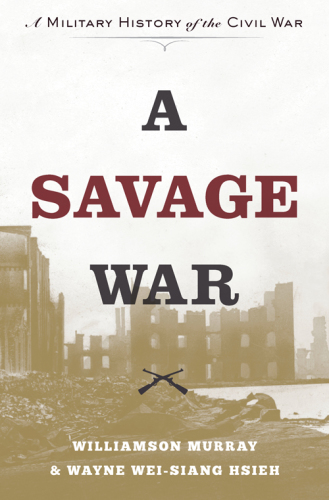
A Savage War
A Military History of the Civil War
کتاب های مرتبط
- اطلاعات
- نقد و بررسی
- دیدگاه کاربران
نقد و بررسی

A genuinely fresh, persuasive perspective on the Civil War.Murray (Emeritus, History/Ohio State Univ.; War, Strategy, and Military Effectiveness, 2011, etc.) and Hsieh (History/U.S. Naval Academy; West Pointers and the Civil War, 2009, etc.) see the war as the first to combine the fervent nationalism of the French Revolution and the technological advances of the Industrial Revolution. Vast armies, fighting on a continental scale, had made their appearance near the beginning of the 19th century. But as Napoleon's failed invasion of Russia showed, the infrastructure to support them over those distances was yet to be created. By the time the Union and Confederacy squared off, the railroad, steamship, and telegraph set the table for a new kind of war. The ability of a few leaders--notably, Lincoln, Grant, and Sherman--to grasp the new paradigm led to the Union victory. The authors give the major battles the proper consideration, but this is not a blow-by-blow account; many lesser engagements go unmentioned. The authors argue that the western theater was of more importance than the more famous battles in the east. For one thing, that was where Grant established the reputation that eventually brought him to command. More importantly, it was where the war on the South's economy took shape, culminating in Sherman's March to the Sea. The authors pull no punches in their evaluations of the leaders on both sides. Even the much-admired Lee is faulted for his conviction that one decisive battle could end the war. The likes of McClellan and Bragg come off far worse. The authors also make useful analogies to the whole history of war, from ancient Greece to the 21st century, and quotes from the memoirs of Grant, Sherman, and others give the participants' perspectives, although a few quotes and anecdotes are recycled too often. A book that will make even readers with a strong knowledge of the war think about how it was fought and why it ended as it did. A winner for Civil War history buffs. COPYRIGHT(1) Kirkus Reviews, ALL RIGHTS RESERVED.

Starred review from August 1, 2016
In this outstanding account of the American Civil War, Murray (emeritus, history, Ohio State Univ.) and Hsieh (history, U.S. Naval Acad.) contend that the war was not an event distinct from those transpiring in Europe in the 19th century. In France, the revolution and Napoleonic Wars provided the template for mobilizing citizen armies to support the battle aims of a nation. In England, the Industrial Revolution afforded the means to supply, arm, and transport armies within the country. Throughout the book, Murray and Hseih state the many similarities the Civil War shares with other major conflicts spanning history, particularly the Peloponnesian War (431-404 BCE). The authors depict the Civil War as the most disruptive event in American history, and the Peloponnesian War as the most disruptive in ancient Greece. Moreover, they compare the Union to Athens and the Confederacy to Sparta. In analyzing the war overall, the authors conclude that Union victory was not a foregone conclusion and credit Lincoln's strong leadership for their victory. VERDICT This expertly written narrative will draw in anyone with an interest in the Civil War at any knowledge level. A great resource for public and academic libraries.--Dave Pugl, Ela Area P.L., Lake Zurich, IL
Copyright 2016 Library Journal, LLC Used with permission.

























دیدگاه کاربران